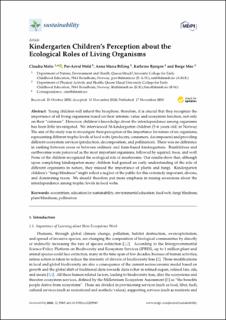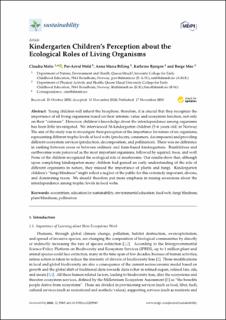| dc.contributor.author | Melis, Claudia | |
| dc.contributor.author | Wold, Per-Arvid | |
| dc.contributor.author | Billing, Anna Maria | |
| dc.contributor.author | Bjørgen, Kathrine | |
| dc.contributor.author | Moe, Børge | |
| dc.date.accessioned | 2023-11-10T07:50:33Z | |
| dc.date.available | 2023-11-10T07:50:33Z | |
| dc.date.created | 2020-11-17T14:11:19Z | |
| dc.date.issued | 2020 | |
| dc.identifier.citation | Sustainability. 2020, 12 (22), 1-15. | en_US |
| dc.identifier.issn | 2071-1050 | |
| dc.identifier.uri | https://hdl.handle.net/11250/3101782 | |
| dc.description.abstract | Young children will inherit the biosphere; therefore, it is crucial that they recognize the importance of all living organisms based on their intrinsic value and ecosystem function, not only on their “cuteness”. However, children’s knowledge about the interdependence among organisms has been little investigated. We interviewed 56 kindergarten children (5–6 years old) in Norway. The aim of the study was to investigate their perception of the importance for nature of six organisms, representing different trophic levels of food webs (producers, consumers, decomposers) and providing different ecosystem services (production, decomposition, and pollination). There was no difference in ranking between sexes or between ordinary and farm-based kindergartens. Bumblebees and earthworms were perceived as the most important organisms, followed by squirrel, trees, and wolf. None of the children recognized the ecological role of mushrooms. Our results show that, although upon completing kindergarten many children had gained an early understanding of the role of different organisms in nature, they missed the importance of plants and fungi. Kindergarten children’s “fungi blindness” might reflect a neglect of the public for this extremely important, diverse, and dominating taxon. We should therefore put more emphasis in raising awareness about the interdependence among trophic levels in food webs. | en_US |
| dc.language.iso | eng | en_US |
| dc.publisher | MDPI (Multidisciplinary Digital Publishing Institute) | en_US |
| dc.rights | Navngivelse 4.0 Internasjonal | * |
| dc.rights.uri | http://creativecommons.org/licenses/by/4.0/deed.no | * |
| dc.subject | ecocentrism; | en_US |
| dc.subject | education for sustainability; | en_US |
| dc.subject | environmental education; | en_US |
| dc.subject | food web; | en_US |
| dc.subject | fungi blindness; | en_US |
| dc.subject | plant blindness; | en_US |
| dc.subject | pollinators. | en_US |
| dc.title | Kindergarten Children’s Perception about the Ecological Roles of Living Organisms | en_US |
| dc.title.alternative | Kindergarten Children’s Perception about the Ecological Roles of Living Organisms | en_US |
| dc.type | Journal article | en_US |
| dc.description.version | publishedVersion | en_US |
| dc.rights.holder | ©2020 Authors | en_US |
| dc.source.pagenumber | 1-15. | en_US |
| dc.source.volume | 12 | en_US |
| dc.source.journal | Sustainability | en_US |
| dc.source.issue | 22 | en_US |
| dc.identifier.doi | 10.3390/su12229565 | |
| dc.identifier.cristin | 1848834 | |
| cristin.ispublished | true | |
| cristin.fulltext | original | |
| cristin.fulltext | original | |
| cristin.qualitycode | 0 | |


